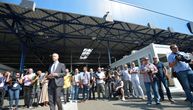"Enemy of my enemy is my friend": Ljubljana feels closer to Belgrade than Zagreb
Slovenian Prime Minister Marjan Sarec has chosen Serbia for his first official visit in the Western Balkans region, where Slovenia has significant foreign and economic interests
Prime Minister Marjan Sarec's official visit to Serbia means strengthening good political relations between Ljubljana and Belgrade, while at the same time cooling relations between Ljubljana and Zagreb, media reports are assessing today.
Slovenian Prime Minister Marjan Sarec has chosen Serbia for his first official visit in the Western Balkans region, where Slovenia has significant foreign and economic interests.
At the invitation of Serbian Prime Minister Ana Brnabic, Sarec is visiting the largest country of the former Yugoslavia today and will be received by the entire Serbian state leadership. In addition to Brnabic, Serbian President Aleksandar Vucic and Serbian Parliament Speaker Maja Gojkovic will meet with Sarec.
The frequency of visits shows that of all Western Balkans countries, Slovenia maintains the closest contacts with Serbia. In January this year, Slovenian President Borut Pahor paid an official visit to Serbia, along with a strong business delegation consisting of over 100 Slovenian businessmen and employers.
This time, Prime Minister Sarec's visit is political in nature, with economic issues set aside as no meeting with businessmen is planned.
The purpose of the visit is to consolidate good political relations and comprehensive cooperation between the two countries, the cabinet of the prime minister of Slovenia announced. The visit means the continuation of meetings between the two countries at the highest political level and the establishment of dialogue at the level of the current prime ministers.
Relations between Slovenia and Serbia are good and close, as evidenced by the fact that Slovenia and Serbia have been organizing joint meetings of governments since 2013, which were introduced in order to strengthen cooperation and gradually resolve open issues.
"The last joint meeting was in February last year in Slovenia, and the next meeting will be determined by the prime ministers. The main topics of talks will be to exchange views on the situation and the European perspective of the Western Balkans, while Sarec will confirm Slovenia's support for Serbia's progress in reforms and its EU membership efforts," explained the prime minister's cabinet.
"Sarec's visit to Serbia is Slovenia's attempt to strengthen its position in Serbia and the Western Balkans, especially given the possible appointment of Slovenia's Janez Lenarcic as European Commissioner for Enlargement and Neighborhood Policy," said Zijad Becirovic, director of the International Institute for Middle East and Balkan Studies (IFIMES) from Ljubljana.
Slovenia will preside over the EU Council in 2021, which means that it must improve and consolidate its position in the region, Becirovic thinks. He noted that Prime Minister Sarec's visit to Serbia, as the first such visit to the region, is significant. Sarec was expected to visit Croatia, with which his country has at least three times more trade - and both countries are EU and NATO members.
"It can be concluded from this that we can still expect open issues with Croatia (not) to be resolved," said Becirovic, pointing to the "frozen" political relations between Slovenia and Croatia, which are the result of Croatia ignoring and not implementing a border arbitration ruling.
Croatia also has poor relations with most of the Western Balkan countries, not only with Slovenia, and is particularly deteriorating those relations with Serbia and Bosnia and Herzegovina, warned Becirevic, who also expects that Croatia will further strain relations with its neighbors during this year's presidential election campaign.
"Perhaps the logic of Sarec, the Western Balkans policy, is, crudely speaking: the enemy of my enemy is my friend," Becirovic added.
At the end of today's official visit, Sarec will also meet with Slovenians living or working in Serbia. It is estimated that up to 10,000 people of Slovenian descent live in Serbia. In addition, the largest number of Slovenian companies abroad are registered in Serbia - more than 1,500, of which 800 are active, employing about 25,000 people.
The value of investments exceeds one billion euros, and among the Western Balkan countries Serbia is the most important investment destination for Slovenian companies. The value of Serbian investments in the Slovenian economy exceeds 200 million euros.
(Telegraf.rs/FoNet)

